Dogs are curious creatures, and they also love to do the same things that their humans are doing. This includes eating what their humans eat.
What dog owner hasn’t looked into the sad, imploring eyes of their canine friend while they were eating?
As a veterinarian, I am frequently asked about what human food items a dog can or cannot eat.
Pet parents love their pups and want to share parts of their meals with them! But it is imperative to ensure that what you are sharing is safe.
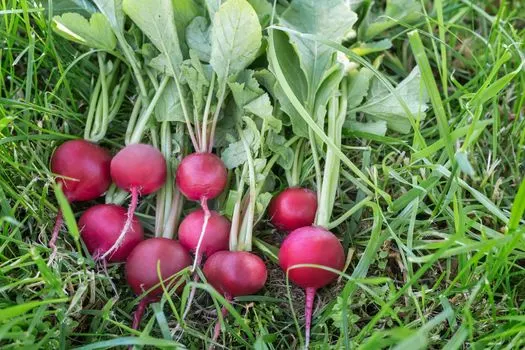 Radishes are a crunchy, tangy, and delicious addition to salads and other dishes. But can dogs eat radishes?
Radishes are a crunchy, tangy, and delicious addition to salads and other dishes. But can dogs eat radishes?
It is always essential to verify that any food you are considering giving to your dog is safe and non-toxic. Several foods that are healthy and safe for humans are dangerous for your dog.
Dogs can eat radishes. Radishes are not toxic to dogs, and many dogs enjoy this root vegetable as a treat. However, there are some things a dog owner should consider before adding radishes to their dog’s diet.
A Bit About Radishes
 Radishes are classified as root vegetables and grow deep in the ground as a root to the radish plant. Producers pull the plants from the ground to harvest the radish root.
Radishes are classified as root vegetables and grow deep in the ground as a root to the radish plant. Producers pull the plants from the ground to harvest the radish root.
The robust red-colored radishes are the most popular variety in the United States. These root vegetables are commonly about the size of a ping pong ball, round, with a bright red outside.
However, radishes come in many shapes, sizes, and colors.
There are varieties of tangy and almost spicy radishes, whereas others have a much lighter and sweeter taste. Some radishes are peppery, while others have a slight umami flavor.
The Nutrition Profile Of A Radish
 Radishes are healthy root vegetables and have documented health benefits when included in the diets of humans. The root vegetable is high in vitamins, minerals, and antioxidants and low in calories.
Radishes are healthy root vegetables and have documented health benefits when included in the diets of humans. The root vegetable is high in vitamins, minerals, and antioxidants and low in calories.
Vitamins
The most plentiful vitamin contained in radishes is Vitamin C. This vitamin aids in immune system function, keeping the body healthy and free of foreign invaders.
A 100-gram serving of raw radishes provides 18% of an adult human’s recommended daily allowance of Vitamin C.
Minerals
Radishes contain minerals that are necessary for both human and animal diets. The two most plentiful minerals found in radishes are calcium and potassium.
Antioxidants
Radishes are rich in antioxidants which are beneficial for human and animal health. In the body, antioxidants function as molecules that fight free radicals.
Free radicals are substances that can cause harm to the body if the level becomes high. They have been linked to multiple illnesses, including diabetes mellitus, heart disease, and cancer.
Fiber
Radishes are high in fiber, aiding the digestion of those consuming the vegetable.
Blood Sugar Regulation
Radishes contain the chemicals isothiocyanate and glucosinolate, which studies have shown may aid in regulating blood glucose levels in the body.
Feeding Radishes To Dogs
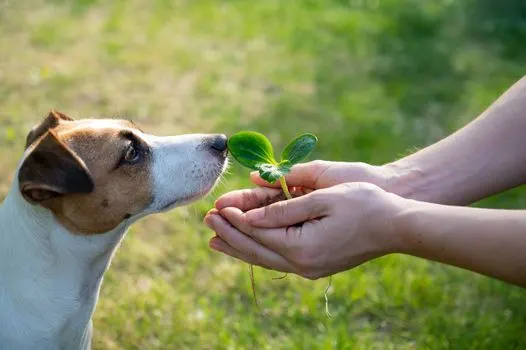 Whether or not a dog will enjoy the taste of radishes is a matter of individual preference and will vary from dog to dog.
Whether or not a dog will enjoy the taste of radishes is a matter of individual preference and will vary from dog to dog.
Dogs are omnivores, which means that their natural diet consists of meat and plant material.
Some dogs love radishes and will consume them as a crunchy treat. The intense flavor of some radishes may put off other dogs.
Some dogs may not love radishes but will eat them because their owner is offering them, and they perceive the radish as a special treat of their human’s food.
Dangers Of Feeding Radishes To Dogs
Though radishes are a healthy snack for a dog, there are some things to be aware of before you feed them to your dog.
Gastrointestinal Issues
As mentioned before, radishes are high in fiber. This can be healthy and aid their digestive tracts; however, fiber can cause issues too.
Some dogs, like their human counterparts, are sensitive to fiber. Ingesting too much fiber can lead to gastrointestinal issues such as gas and loose stools.
The number of radishes that may cause intestinal upset varies widely between dogs. Some may be able to eat a lot of raw radishes and never have any issues.
However, some dogs may become ill from consuming a single radish.
It is essential to start with a minimal amount anytime you are introducing a new food into your dog’s diet.
On the other hand, for a dog already having loose stool or diarrhea, adding fiber to the diet can improve their stool.
Though radishes are not usually the fiber supplement recommended for this, they could theoretically work.
Allergies To Radishes
A human or dog may be allergic to any food, and radishes are no exception. Though no documented cases of dogs being allergic to radishes, it is always possible.
Signs that may be seen if a dog is allergic to radishes include:
- Vomiting
- Severe diarrhea
- Hives or itching
- Facial Swelling
- Lethargy
If any of these are seen after a dog eats a radish, you should immediately take your pet to the nearest emergency veterinarian or an emergency hospital.
How Many Radishes Are Safe To Feed A Dog?
As mentioned earlier, this is very dog specific. In most cases, if radishes are given in small amounts, most dogs will not experience any ill effects.
Keep in mind that moderation is an essential factor. Always introduce new foods or treats slowly and in small amounts. You can get an idea of whether or not the dog is going to tolerate the addition.
Always contact your veterinarian if you have questions about your dog’s dietary needs or whether you should feed a particular food or treat.
Types Of Radishes Dogs Can Eat
Many pet parents wonder if how the radish is prepared makes a difference in the safety of feeding radishes to their dogs.
Raw Radishes
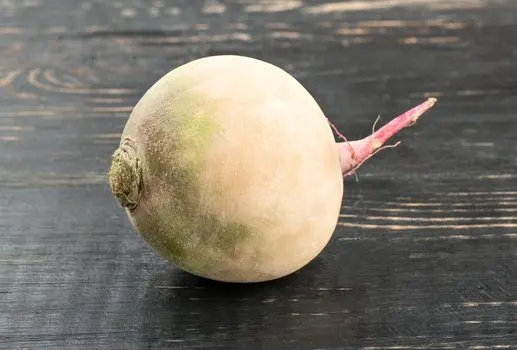 For dogs, raw radishes are the most commonly fed type of radish. Most dogs will do fine if fed small amounts of raw radishes.
For dogs, raw radishes are the most commonly fed type of radish. Most dogs will do fine if fed small amounts of raw radishes.
It is essential to ensure that the radish you feed your dog is fresh, not rotten or moldy. Though rare, molds that grow on vegetables can have severe side effects for dogs.
Raw radishes tend to have a stronger flavor than their cooked counterparts. Many dogs do not enjoy the taste of raw radishes, and if this is the case with your dog, you may want to try a different treat.
Cooked Radishes
Cooked radishes may be more palatable to our furry friends as the cooking process gives the vegetable a milder flavor.
A cooked radish alone is safe to feed your dog. However, it is essential to be aware of any seasonings on the cooked radish that are toxic.
Ingredients to watch out for include:
- onions
- garlic
- salt
- fatty oils or butter
Onions, garlic, and salt are all potentially toxic to dogs, especially in large quantities. Fatty oils and butter are not toxic but can definitely cause a dog gastrointestinal distress.
What To Do If Your Dog Eats Radishes
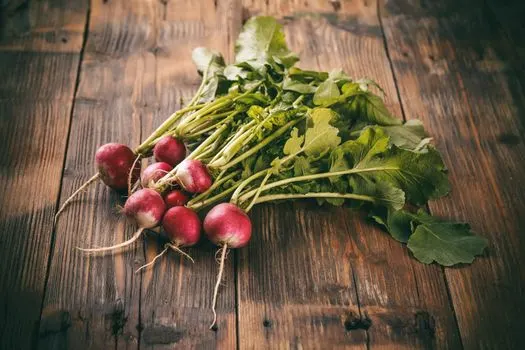 In some cases, a dog will get into something it should not and will eat radishes that were not given to them as a treat. This can be a different situation than a dog who is being intentionally fed a radish.
In some cases, a dog will get into something it should not and will eat radishes that were not given to them as a treat. This can be a different situation than a dog who is being intentionally fed a radish.
If your dog has gotten into the trash or has eaten radishes without your knowledge, it is unlikely that a small amount of radish will be a problem for them.
Suppose your dog consumed many radishes, or the radishes were coated with toxic substances or even contained in a dish that could have other toxic ingredients.
In that case, you should contact your dog’s veterinarian right away.
Ingesting human food or getting into the trash puts dogs at high risk for pancreatitis, which can be fatal.
The owner should catalog what was in the trash or food the dog ate and take the list to the veterinarian with the dog.
Related Questions
Can puppies eat radishes?
Young dogs and puppies often have more sensitive gastrointestinal systems than adult dogs. They also have different dietary requirements, including more protein and calories.
It is not advisable to feed radishes to puppies until they are older. However, if a puppy accidentally eats a moderate amount of radish, it is unlikely to cause problems beyond gas and gastrointestinal upset.
Can dogs eat horseradish?
Horseradish is a strong-smelling and hot-tasting topping or condiment made from the white root of the horseradish plant. A dog can technically eat horseradish, but it is likely not a good idea.
The majority of dogs do not like spicy foods. Feeding a dog very spicy foods will likely cause gastrointestinal upset and possible mouth, nose, throat, intestinal tract, and urinary tract irritation.
Dr. Jamie Whittenburg is a vet with 15 years of clinical experience. She graduated from Kansas State University College of Veterinary Medicine in 2006. Her area of expertise is small animal general practice, equine practice, surgery, and academia.
Dr. Whittenburg operates her own hospital in Lubbock, TX, named Kingsgate Animal Hospital. Medically, she’s most interested in practicing general surgery and feline medicine. When not at work, Dr. Whittenburg enjoys outdoor activities, reading, and spending time with her family.

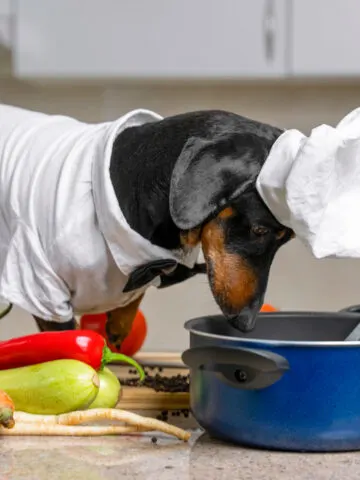

Leave a comment
You must be logged in to post a comment.